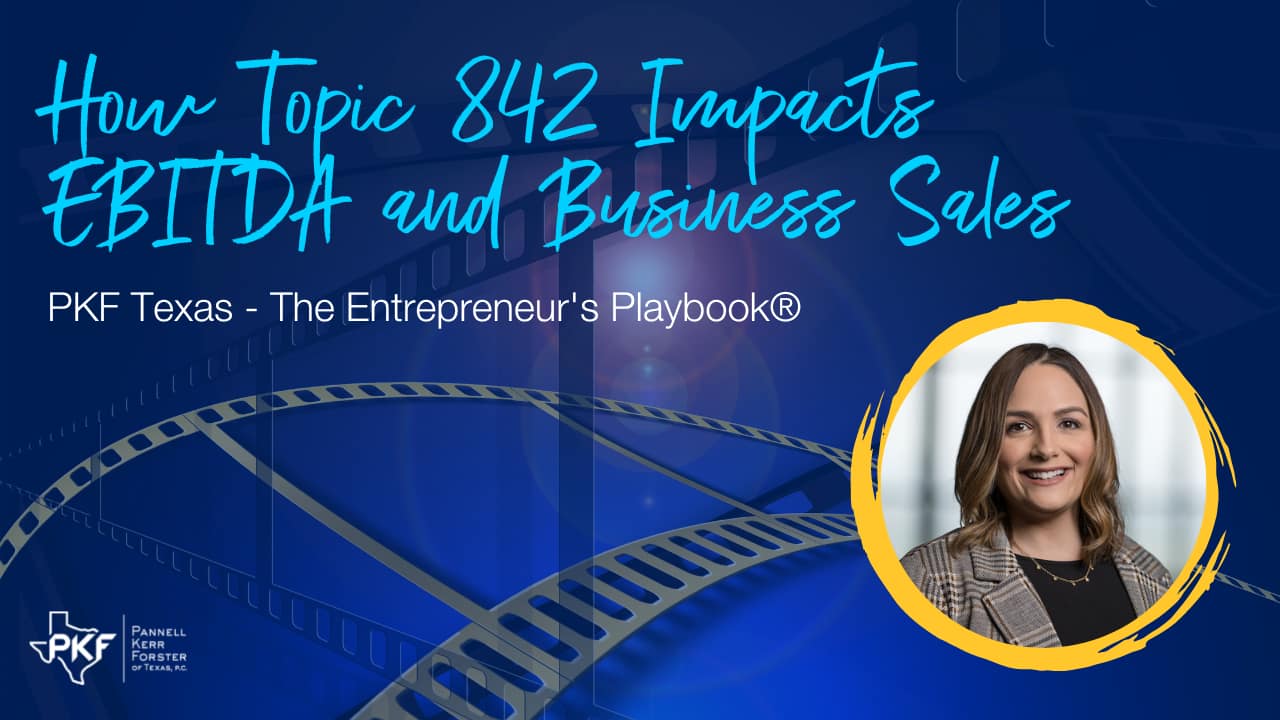Topic 842 is a hot topic in the accounting industry, affecting non-public entities this year. With the increased activity in the transaction space, we want to know how the new lease accounting standard impacts EBITDA and business sale valuations. In this next PKF Texas – The Entrepreneur’s Playbook® episode, Audit Senior Manager Kimberly Wood, CPA, CEPA, discusses the standard’s impact.
Jen: This is the PKF Texas – Entrepreneur’s Playbook®. I’m Jen Lemanski, and I’m back again with Kimberly Wood, a Senior Manager on our Transaction Advisories Service team and one of the Approachable Advisors™ here at PKF Texas. Kimberly, welcome back to The Playbook.
Kimberly: Thanks for having me.
About Topic 842
Jen: So, I’ve heard a lot in kind of the audit world about this new ASC 842, and it’s a new lease standard. What exactly does all that mean?
Kimberly: Yeah, so in 2016, FASB issued Topic 842, which covers leases, and they subsequently extended that effective date with ASU 2019-10. So, this update is effective for non-public entities with reporting periods starting after December 15th, 2021, which means that it was effective January 1st, 2022. The update has potential impact on EBITDA in some rare cases and could also impact the initial metric often used for valuation of business acquisitions. It is unlikely that there’s a material impact on the valuations, but proper due diligence should be performed.
Topic 842’s Impact
Jen: So, how will the new lease standard impact EBITDA and business sales?
Kimberly: Yes. So, under the old standards ASC 840, there are two types of leases: operating leases and capital leases. Cash expenditures related to capital leases, reduced debt payments, or the lease liability and interest expense. Now, they also had amortization expense, which related to the asset put on the books at the as section of the lease. Now, under the old standard operating leases, the expenses associated with this were a reduction of EBITDA recorded rent expense and on a straight-line basis. This is the same pretty much for the new standard. Now, the expenses were not recorded on the balance sheet, but the future payments were disclosed in the footnotes to the financial statements.
The biggest change with the new lease rules in operating leases will be required to be recorded on the balance sheet. So, that will be a right-of-use asset in a lease liability. One exception to this is if for the leases for 12 months or less, and it’s not going to be renewed, operating leases then will show as debt as the lease liability on the balance sheet, and potential buyers looking to make a cash free, debt free deal will want to take this into consideration and negotiating terms.
Jen: Well, that makes a lot of sense.
Kimberly: Yeah, it’s easy enough, right? So, it is possible in often uncommon situations that an operating lease will be, under the old rules, could be classified as a finance lease under the new rules. So, as a result of this, that would increase EBITDA because then again, the debt, the cash expenditures would be paying the debt and the expense would be related to amortization and interest, which is subsequently deducted from EBITDA or added back to EBITDA, shall I say. So, the update could also affect cash free, debt free transactions by increasing the amount of debt on the balance sheet.
Jen: So, that’s a lot of great information. What changes do companies need to make to EBITDA and the new lease standard?
Kimberly: Yeah, so while it’s unlikely that EBITDA and value drivers will significantly be impacted by the new lease standard, we consider it important to perform proper financial due diligence related to leases. This can be done just with your typical buy-side, sell-side, quality of earnings.
Jen: Perfect. Well, that sounds like a lot of information and that our viewers should call you if they have any questions about the new lease standard and what lease accounting looks like.
Kimberly: Yes, for sure.
Jen: Perfect. Well, we’ll get you back to talk about some more transaction-related topics in the future. Sound good?
Kimberly: Sounds great.
Jen: This has been another thought leadership production brought to you by PKF Texas – The Entrepreneur’s Playbook®. For more information about Topic 842 and other topics, visit www.PKFTexas.com.

